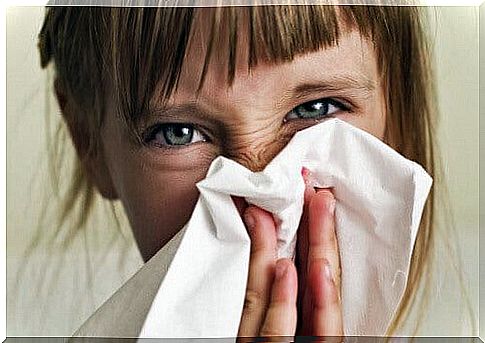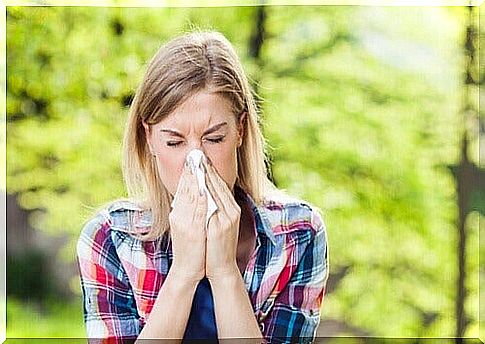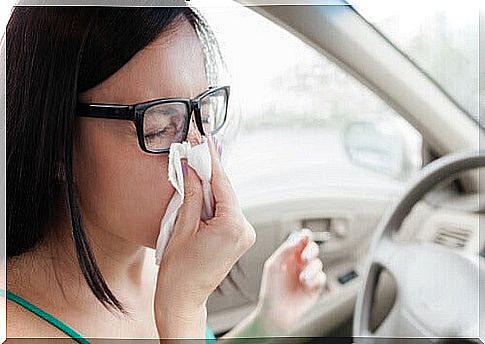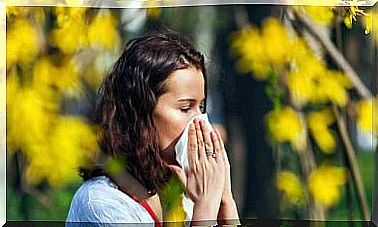What Happens When You Hold Back Your Sneeze?

You’re in the middle of a meeting or on the subway when you find yourself needing to sneeze. You don’t want everyone to hear you though – this is so embarrassing. What can you do then? You keep your sneeze in so he doesn’t make a sound.
You probably know what we’re talking about: when you pinch your nose with your fingers and keep your mouth shut so no sound can come out.
However, did you know that this habit is super bad for your health? In this article we explain why this is the case and also why a good sneeze plays an important role without negatively affecting your body.
How and why should we sneeze?
Sneezing is a defense mechanism that your body (or, more accurately, your respiratory system) uses to expel air from the lungs through the nose and mouth. It is a reflexive and convulsive act. This happens when something irritates your airways.
This causes air to be expelled from the lungs in a rapid and forceful manner in a short period of time. Your abs cause your diaphragm to suddenly rise. This puts pressure on your lungs and the pharynx opens.

When this air shoots out of your body, it can reach speeds of up to 120 kilometers per hour! The speed is at least 65 kilometers per hour.
Another interesting fact about sneezing is that the moment the air shoots out of your body, you are unable to keep your eyes open. Try to pay attention next time. You will surely understand what we mean.
This is also a reflex of your body. In this case, it ensures that your eyes are not damaged when the pressure in your sinuses rises.
You can also prevent bacteria and germs from your saliva from coming into contact with your mucous membranes and thus causing an infection.
A sneeze never comes alone
There are several reasons why we as humans sneeze and some of them are:
- Cold and flu. Especially when your body produces a lot of mucus.
- Allergic reactions. These are your body’s natural response to certain substances.
- Sun exposure.
One of the most interesting data about sneezing is that sneezing never “acts alone.” What does this mean? Chances are you’ll have to sneeze a few more times after the first sneeze.
This differs from person to person. However, it is not at all strange to have to sneeze up to ten times in a row!
When you have to sneeze several times in a row, it is because not all the air that had accumulated in your lungs has been released. It may also be because the substance or other factor that initially caused you to sneeze has not completely gone away.
This means that your respiratory system has failed to do its job properly or hasn’t worked hard enough.
And then you have people who think that the next day the weather will be nice if they sneeze three times in a row. Or they think this will bring happiness in some other way. People also often find it necessary to always say “health” when someone sneezes.
Is it a bad idea to hold back your sneeze?

It is common for people to hold in their sneezes. They are ashamed to sneeze in public and spread their saliva and germs around.
Maybe when you were little someone told you that it’s not nice to sneeze in public. Or maybe you just don’t like the feeling of sneezing.
However, several studies show that blocking the air released during sneezing can actually be bad for your health.
When you hold back your sneeze, for example, you can cause the exact opposite of what a sneeze is actually intended for.
The irritating substances and particles are then sent in instead of out. This blast of air can damage the tissues in your nose, which can damage blood vessels and veins.
Pathogens and other germs can also penetrate deeper into your nose, middle ear, sinuses, etc., causing multiple infections.

At the same time, you put more pressure on your respiratory system by suppressing a sneeze. The most common damage that can occur is when a burst artery causes a nosebleed, bleeding into your eardrum, or eye problems.
This causes your nasal passages and eardrum to become inflamed. As a result, you can suffer from headaches, ear infections and even hearing problems.
Maybe you thought your ears were just a little clogged or you were just a little dizzy. But this is what happens when you hold back your sneeze.
Sneeze well without too much noise
But what if you’re in a room full of people? One of the main reasons we try to keep our sneezes in is to avoid bothering those around us.
And yes, of course you don’t feel like sneezing super hard and just letting the saliva and germs fly around. However, there is a way to keep this to a minimum while still being able to sneeze properly.
How? Simply by holding a tissue in front of your mouth. This allows you to simply let the air and the micro-organisms shoot out of your body without any problems. At the same time, you protect others by preventing the spread of bacteria, diseases or possible infections.
Another common option (although this option isn’t 100% effective) is to sneeze into the corner of your elbow.
After you have used your tissue and you no longer have to sneeze (at least not at that moment), it is important that you wash your hands right away. This way you eliminate the bacteria and viruses that are left behind.
Make sure to wash your hands well with hot water and soap for at least 20 seconds, especially before eating. This can help prevent diseases such as:
- Flu
- Common cold
- Bronchitis
- hepatitis A
- Infectious Diarrhea









